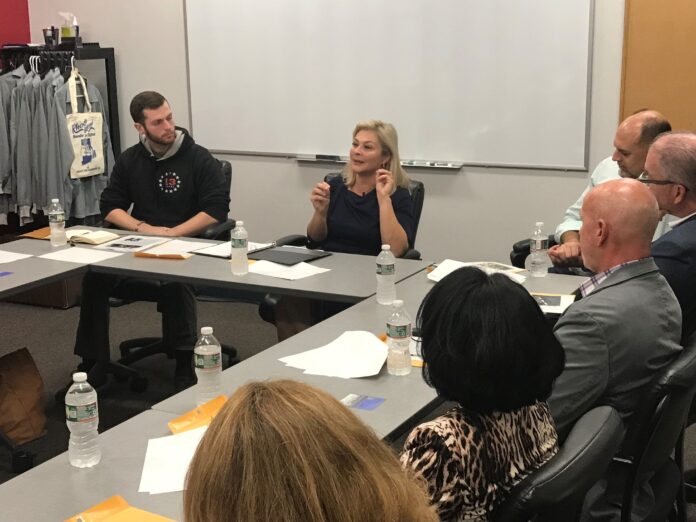
WARWICK – Referring to it as a “promise to working families,” Republican gubernatorial candidate Ashley Kalus on Thursday unveiled an economic plan for the state to 14 business owners and representatives in a roundtable discussion at VR Industries Inc.
During the hourlong discussion, Kalus outlined her 12-page policy, which highlighted how the government interacts with businesses, lowering tax rates, harnessing Rhode Island’s blue economy, improving education and adding more housing as ways for the Ocean State to become more competitive economically with other states.
Her plan, she said, is based on discussions she has had with business representatives from around the state in her quest to try to unseat incumbent Gov. Daniel J. McKee.
“In Rhode Island, there’s been a whole lot of vision, but a lack of execution and … supporting your businesses,” said Kalus, who runs Chicago-based Doctors Test Centers, which administered COVID-19 tests and vaccinations across the state. “You need somebody who is going to deliver services in a competent manner that is credible.”
Kalus’ new tax plan calls for slashing the personal income tax for residents earning less than $50,000 from 3.75% to zero. Also, she proposes lowering the sales tax to 6.25% to bring it in line with Massachusetts. Kalus said the state’s current tax structure is “not competitive” and changes will help entice local businesses to continue call Rhode Island home.
“As a small-business owner, the challenge is your business is rooted in the community,” Kalus said. “Where big businesses can often leave, a small business has ties in the community to make it so that even in an uncompetitive business environment, you don’t have very many options other than to take what you’re given. That’s not helpful in terms of growth. We’d like to change that approach.”
Kalus would also create a governor’s small-business committee that will provide regular updates on that segment of the business community. The committee would consist of government officials, leadership from R.I. Commerce Corp., local chambers of commerce leaders, mayors and town administrators.
The plan also calls for the state to conduct a return-on-investment economic performance audit to evaluate which tax incentives and credits “are contributing to tax base expansion, job creation and development, and which ones are not.” Kalus previously told Providence Business News the state needs to “stop bribing businesses to come here” with tax credits and create “the environment for businesses to want to be here.”
On Thursday, Kalus said the state has an “unfortunate history of using economic development as a form of corporate welfare.”
“Governments are not great at picking winners and losers in the private market,” she said.
Kalus also proposes expanding Pathways in Technology Early College High School Technology training, or P-Tech, to help build a workforce in advanced manufacturing, data analysis, information technology and cybersecurity, among other similar industries. She even called for having a career and technical training academy, similar to what the William M. Davies, Jr. Career and Technical High School in Lincoln offers, in each county of the state.
Kalus said the notion that only going to a four-year college to get the proper training for local workforce is “an elite classist idea,” and that thought needs to be shifted. “It has hurt our economy because we’re missing individuals in the trades,” Kalus said. “College is not the only path. If a kid wants to go into a trade, it should be a choice, and not a secondary decision.”
Anita Bruno, CEO of the Rhode Island Women in the Trades, said reeducating families and improving education in order to build the workforce is “important,” particularly offering a better understanding that college is not the only option to become educated.
“You don’t have to go in debt to be a doctor,” Bruno said. “You can go to a trade school and make money. If we focus on education… the businesses will thrive.”
Kalus is also proposing increased investments for startups and innovation-based businesses to support the blue economy. She also supports the proposed $100 million bond to improve the University of Rhode Island’s Narragansett Bay Campus that voters will decide on next month.
Kalus would create a larger supply of affordable housing for families and employees throughout Rhode Island. Kalus told PBN after Thursday’s meeting that, with affordable housing, the state does not take advantage of the federal match as opposed to other states, and that needs to change for the state to be competitive.
In the short term, Kalus wants to work with cities and towns that are interested in accessory-dwelling units and converting older, single-family homes into multifamily homes, calling it a “fast way to develop housing.”
“We need to build starter homes. We need to develop a path so that our younger generation sees a path to home ownership,” Kalus said, “and get out of rentals.”
(MINOR edits to tighten.)
James Bessette is the PBN special projects editor, and also covers the nonprofit and education sectors. You may reach him at Bessette@PBN.com. You may also follow him on Twitter at @James_Bessette.












